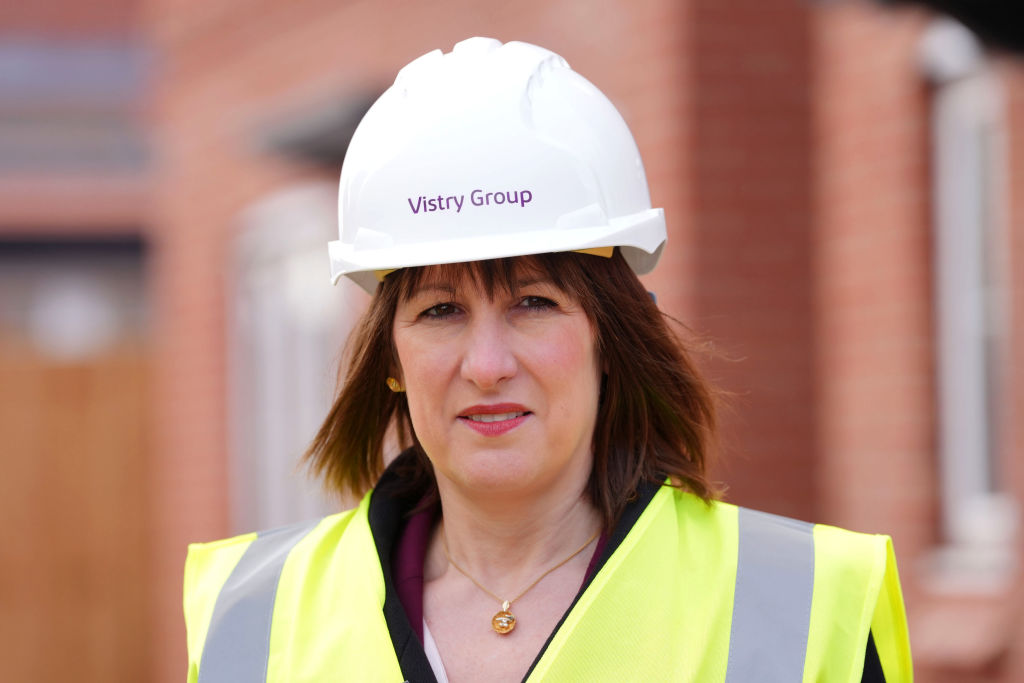Here are four reasons why Britain’s house price crash is coming
The pressure on house prices and property can only get worse with the economy turning down and taxes rising, says Matthew Lynn


Get the latest financial news, insights and expert analysis from our award-winning MoneyWeek team, to help you understand what really matters when it comes to your finances.
You are now subscribed
Your newsletter sign-up was successful
Want to add more newsletters?

Twice daily
MoneyWeek
Get the latest financial news, insights and expert analysis from our award-winning MoneyWeek team, to help you understand what really matters when it comes to your finances.

Four times a week
Look After My Bills
Sign up to our free money-saving newsletter, filled with the latest news and expert advice to help you find the best tips and deals for managing your bills. Start saving today!
Whatever other problems the British economy may face, you can usually rely on one thing: through good times and bad, the property market remains buoyant. There has not been a really significant crash since the early 1990s, and ever since then, a home has been the best investment anyone could make. In 1990, the average house cost £58,000. By this year, that had risen to £270,000, a rise of 365%. Even adjusted for inflation, the average price has more than doubled. The UK does not build nearly enough homes, especially given the rapid rise in the total population. So the existing ones keep getting more valuable.
Yet signs are starting to emerge that the market is turning. In 2022, prices were rising by 14% a year. That has slowed dramatically, and we are now starting to see absolute falls. The average price fell by 1.2% in July, a fall of almost £5,000 on the average property, according to figures from Rightmove released on Monday. In London, which used to keep driving prices higher, the fall was a more significant 1.5%. Of course, that is just one monthly set of figures. The data are always volatile. Even so, Rightmove is reporting the largest falls in summer prices for 20 years. That may well be a sign that prices are starting to decline significantly. Here are four factors contributing to the coming crash.
Why a house price crash is around the corner
First, the economy has stagnated. GDP declined again last month, and it looks certain that it will shrink over the quarter as a whole. After the punishing tax raid on employers’ national insurance, companies are cutting back on jobs, with the number of people in employment falling by more than 200,000 since the last Budget. Retail sales are struggling, factories are closing down because they can’t afford Europe’s most expensive electricity, and pubs and restaurants are closing as business rates rise. The economy is flat, at best, and may soon be heading into a full-blown recession. That means there are fewer people with money to spend on a new home.
MoneyWeek
Subscribe to MoneyWeek today and get your first six magazine issues absolutely FREE

Sign up to Money Morning
Don't miss the latest investment and personal finances news, market analysis, plus money-saving tips with our free twice-daily newsletter
Don't miss the latest investment and personal finances news, market analysis, plus money-saving tips with our free twice-daily newsletter
Next, landlords and second-home owners are quitting. The government has made it clear it does not approve of people owning more than one home. Landlords have been hit with big increases in tax. Now, renters’ rights are being extended as well, making it far harder for a landlord to take back their property. Many are getting out of the sector as quickly as possible before the new laws come into force. Likewise, councils are imposing extra taxes on second homes, with many facing double, or even triple, the usual rate, meaning it can cost an extra £10,000 a year or more to own a weekend place by the sea. There are an estimated 4.4 million private rented homes in the UK, and another 700,000 second homes. If most of those end up being sold, it will add a huge amount of extra supply.
Thirdly, taxes and green levies are still increasing. Local authorities are allowed to push up council tax by 5% a year, every year, and most are so strapped for cash that they are using the entire legal limit. Stamp duty has been restored to its full rate for all buyers, adding tens of thousands to the cost of buying even the average home. Meanwhile, energy bills are rising to cover the cost of the switch to renewable power, and water may well soon be metered, meaning higher bills for those with bigger properties and gardens. People who may have thought of trading up won’t be able to afford it, and that will choke off demand.
Finally, there is a looming fiscal crisis. UK bond yields are already way above France, Germany and even Greece as investors demand a premium for lending to a government that looks to have lost control of public spending. The deficit is running at more than 5% of GDP, and any attempts to reduce it run into fierce opposition. Higher taxes are hitting the economy so hard that they bring in very little revenue. Britain is starting to look a lot like Greece in the run-up to the eurozone crisis 15 years ago.
If the market panics, the Bank of England will have no choice but to push up interest rates – and that would be the trigger for a full-scale collapse in house prices.
This article was first published in MoneyWeek's magazine. Enjoy exclusive early access to news, opinion and analysis from our team of financial experts with a MoneyWeek subscription.
Get the latest financial news, insights and expert analysis from our award-winning MoneyWeek team, to help you understand what really matters when it comes to your finances.

Matthew Lynn is a columnist for Bloomberg and writes weekly commentary syndicated in papers such as the Daily Telegraph, Die Welt, the Sydney Morning Herald, the South China Morning Post and the Miami Herald. He is also an associate editor of Spectator Business, and a regular contributor to The Spectator. Before that, he worked for the business section of the Sunday Times for ten years.
-
 How a ‘great view’ from your home can boost its value by 35%
How a ‘great view’ from your home can boost its value by 35%A house that comes with a picturesque backdrop could add tens of thousands of pounds to its asking price – but how does each region compare?
-
 What is a care fees annuity and how much does it cost?
What is a care fees annuity and how much does it cost?How we will be cared for in our later years – and how much we are willing to pay for it – are conversations best had as early as possible. One option to cover the cost is a care fees annuity. We look at the pros and cons.
-
 "Botched" Brexit: should Britain rejoin the EU?
"Botched" Brexit: should Britain rejoin the EU?Brexit did not go perfectly nor disastrously. It’s not worth continuing the fight over the issue, says Julian Jessop
-
 'AI is the real deal – it will change our world in more ways than we can imagine'
'AI is the real deal – it will change our world in more ways than we can imagine'Interview Rob Arnott of Research Affiliates talks to Andrew Van Sickle about the AI bubble, the impact of tariffs on inflation and the outlook for gold and China
-
 Tony Blair's terrible legacy sees Britain still suffering
Tony Blair's terrible legacy sees Britain still sufferingOpinion Max King highlights ten ways in which Tony Blair's government sowed the seeds of Britain’s subsequent poor performance and many of its current problems
-
 Rachel Reeves is rediscovering the Laffer curve
Rachel Reeves is rediscovering the Laffer curveOpinion If you keep raising taxes, at some point, you start to bring in less revenue. Rachel Reeves has shown the way, says Matthew Lynn
-
 ISA reforms will destroy the last relic of the Thatcher era
ISA reforms will destroy the last relic of the Thatcher eraOpinion With the ISA under attack, the Labour government has now started to destroy the last relic of the Thatcher era, returning the economy to the dysfunctional 1970s
-
 Investing in forestry: a tax-efficient way to grow your wealth
Investing in forestry: a tax-efficient way to grow your wealthRecord sums are pouring into forestry funds. It makes sense to join the rush, says David Prosser
-
 'Expect more policy U-turns from Keir Starmer'
'Expect more policy U-turns from Keir Starmer'Opinion Keir Starmer’s government quickly changes its mind as soon as it runs into any opposition. It isn't hard to work out where the next U-turns will come from
-
 Britain heads for disaster – what can be done to fix our economy?
Britain heads for disaster – what can be done to fix our economy?Opinion The answers to Britain's woes are simple, but no one’s listening, says Max King